_________________________________________
_________________________________________
|
Mango
Mangifera indica |
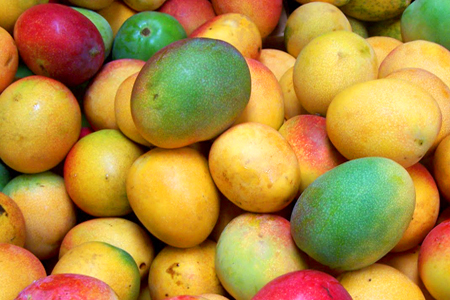 |
| Fruit Description |
Mango
“The king of the fruits," mango fruit is one of the most popular, nutritionally rich fruits with unique flavor, fragrance, taste, and heath promoting qualities making it a common ingredient in new functional foods often labeled “super fruits."
Mango is one of the delicious seasonal fruits grow in the tropics. Internally, juicy flesh features orange-yellow in color with numerous soft fibrils radiating from the husk. Its flavor is pleasant and rich, and tastes sweet with mild tartness. A high-quality mango fruit should feature no or very less fiber content and minimal sour taste. Mango seed (stone) may either has a single embryo, or sometimes polyembryonic.
Take a bite of a juicy, sweet mango and you are experiencing a delicious taste enjoyed by countless people from ancient times until today. According to the Orlando-based National Mango Board (NMG), a mango industry-sponsored research, promotion and consumer information program, mangos are known to be rich in vitamins C and A, as well as fiber.
Mango latex allergy, especially with raw, unripe mangoes is common in some sensitized individuals. Immediate reactions may include itchiness at the angle of the mouth, lips, and tip of the tongue. In some people, the reactions can be severe, with manifestations like swelling of the lips, ulceration at the mouth angles, respiratory difficulty, vomiting, and diarrhea.
This reaction develops because of the anacardic acid present in raw, unripe mangoes. Cross-allergic reactions with other Anacardiaceae family fruits are quite common. Such events may be a rarity with completely ripe fruits; however, people with known case of mango fruit allergy may have to avoid eating them
Source: http://www.nutrition-and-you.com/mango-fruit.html
|
_________________________________________
_________________________________________
|

|
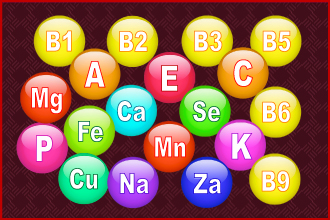
|
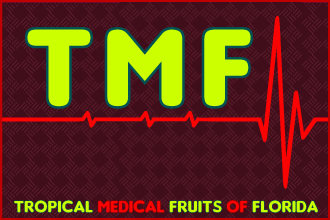
|
| |
|
|
| International Scientific Research |
Vitamin & Mineral Medicine |
Optimal Health & Nutrition |
"The tamarind fruit pulp has been official in the British and American pharmacopoeias and most other international pharmacopoeias for its medicinal properties.
Some 200,000 lbs (90,000 kg) of the shelled fruits have been annually imported into the United States for the medicinal drug trade."
|
| Nutritional Information |
Health Benefits - Mango
Mango is rich in several groups of antioxidants, beta carotene, vitamin C and potassium. In particular, mango is rich in carotene which is converted to vitamin A in the body. Vitamin A benefits eyesight, bones, skin, mucous membranes and the immune system while vitamin C helps to strengthen the skin, skeleton, blood vessels and teeth.
Mango contains several types of antioxidizing phenolic compounds such as mangiferin, which can be found in many fruits and herbs. The compound is traditionally used to treat diabetes. Mangiferin also facilitates and supports digestion.
Mango fruit is rich in pre-biotic dietary fiber, vitamins, minerals, and poly-phenolic flavonoid antioxidant compounds. According to new research study, mango fruit has been found to protect against colon cancer, breast cancer, leukemia and prostate cancers. Several trial studies suggest that polyphenolic anti-oxidant compounds in mango are known to offer protection against breast and colon cancers.
Mango fruit is an excellent source of Vitamin-A and flavonoids like beta-carotene, alpha-carotene,and beta-cryptoxanthin. 100 g of fresh fruit provides 765 mg or 25% of recommended daily levels of vitamin A. Together; these compounds are known to have antioxidant properties and are essential for vision. Vitamin A is also required for maintaining healthy mucus membranes and skin. Consumption of natural fruits rich in carotenes is known to protect the body from lung cancer and oral cavity cancers.
Fresh mango is a good source of potassium. 100 g fruit provides 156 mg of potassium while just 2 mg of sodium. Potassium is an important component of cell and body fluids that helps controlling heart rate and blood pressure.
Mango is also a very good source of vitamin-B6 (pyridoxine), vitamin-C and vitamin-E. Consumption of foods rich in vitamin C helps the body develop resistance against infectious agents and scavenge harmful oxygen-free radicals. Vitamin B-6 or pyridoxine is required for GABA hormone production within the brain. It also controls homocystiene levels within the blood, which may otherwise be harmful to blood vessels resulting in coronary heart disease (CAD) and stroke.
Further, it composes moderate amounts of copper. Copper is a co-factor for many vital enzymes, including cytochrome c oxidase and superoxide dismutase (other minerals function as co-factors for this enzyme are manganese and zinc). Copper is also required for the production of red blood cells.
Remedy for heat stroke: Juicing the fruit from green mango and mixing with water and a sweetener helps to cool down the body and prevent harm to the body. From an ayurvedic viewpoint, the reason people often get diuretic and exhausted when visiting equatorial climates is because the strong “sun energy” is burning up your body, particularly the muscles. The kidneys then become overloaded with the toxins from this process.
Source: http://goforlife.eu/superfood-info/mango
Source: http://www.nutrition-and-you.com/mango-fruit.html
Read more: http://www.care2.com/greenliving/10-health-benefits-of-mangos.html#ixzz2Beg7bNbY
Anti-Oxidants - Carotenoids - Polyphenols - Mango Peel
Mango peel is also rich in phytonutrients, such as the pigment antioxidants like carotenoids and polyphenols.
Source: http://www.naturalnews.com/027992_mango_breast_cancer.html#ixzz2BJRSK14e
Astringents - Mangiferine - Mango Bark
Bark from the mango tree contains mangiferine and is astringent and employed against rheumatism and diphtheria in India. The resinous gum from the trunk is applied on cracks in the skin of the feet and on scabies, and is believed helpful in cases of syphilis.
Source: http://www.naturalnews.com/027992_mango_breast_cancer.html#ixzz2BJRSK14e
Astringents - Tannin - Mango Flowers
Dried mango flowers, containing 15% tannin, serve as astringents in cases of diarrhea, chronic dysentery, catarrh of the bladder and chronic urethritis resulting from gonorrhea.
Source: http://www.naturalnews.com/027992_mango_breast_cancer.html#ixzz2BJRSK14e
Astringents - Mango Leaves / Bark / Stems
In some of the islands of the Caribbean, the leaf decoction is taken as a remedy for diarrhea, fever, chest complaints, diabetes, hypertension and other ills. A combined decoction of mango and other leaves is taken after childbirth. Extracts of unripe fruits and of bark, stems and leaves have shown antibiotic activity.
Source: http://www.naturalnews.com/027992_mango_breast_cancer.html#ixzz2BJRSK14e
Astringents - Mango Seeds
Mango kernel decoction and powder (not tannin-free) are used as vermifuges and as astringents in diarrhea, hemorrhages and bleeding hemorrhoids. The fat is administered in cases of stomatitis.
Source: http://www.naturalnews.com/027992_mango_breast_cancer.html#ixzz2BJRSK14e
Cancer - Breast - Colon - Lung - Prostate - Polyphenols - Mango
Research has shown antioxidant compounds in mango fruit have been found to protect against colon, breast, leukemia and prostate cancers. These compounds include quercetin, isoquercitrin, astragalin, fisetin, gallic acid and methylgallat, as well as the abundant enzymes.
Mango has been found to prevent or stop certain colon and breast cancer cells. A mango research initiative has turned up an unexpected and groundbreaking discovery: in laboratory experiments in Texas A&M University's AriLife Research department mango fruit prevented or stopped cancer growth in certain breast and colon cell lines.
Food scientists Dr. Susanne Talcott and Dr. Steve Talcott, used the five varieties of mangos (Kent, Francine, Ataulfo, Tommy/Atkins and Haden) most common in the US and specifically tested polyphenol extracts from the fruit on colon, breast, lung, leukemia and prostate cancer cells.
Polyphenols are natural substances in plants that are antioxidants with the potential to protect the body from disease. The Talcotts zeroed in on evaluating polyphenolic compounds in mangos known as gallotannins, a class of natural bioactive compounds believed to help prevent or block the growth of cancer cells.
The results? The Talcotts' experiments showed that the mango extract demonstrated some cancer fighting ability when tested on lung, leukemia and prostate cancer cells. But when tested on the most common breast and colon cancers, mango compounds were found to have even stronger anticancer abilities. In fact, the mango extract caused the breast and colon cancer cells to undergo apoptosis -- programmed cell death.
"Additionally, we found that when we tested normal colon cells side by side with the colon cancer cells, the mango polyphenolics did not harm the normal cells," Dr. Susanne Talcott said in a statement to the press. "That is a general observation for any natural agent, that they target cancer cells and leave the healthy cells alone, in reasonable concentrations at least."
The researchers documented that the cancer cell cycle (the division process cells go through) was interrupted by mango extract. This is crucial information, Suzanne Talcott said in a press statement, because it could explain a possible mechanism for how the cancer cells are prevented or stopped by phytochemicals in mangos. "For cells that may be on the verge of mutating or being damaged, mango polyphenolics prevent this kind of damage," she explained.
The scientists have conducted additional research on the colon cancer cell lines because mangos contain small molecules that are readily absorbed in the colon as well as larger molecules that are not absorbed and remain present longer in the colon. Those facts could potentially make eating mangos a potent way to help prevent colon cancer. In fact, the Talcotts are hoping to next conduct a small clinical trial to see if mangos can prevent colon cancer in people at high risk for a malignancy because they have increased inflammation in their intestines.
Source: http://www.naturalnews.com/027992_mango_breast_cancer.html#ixzz2BJRSK14e
Diabetes Health - Low GLycemic Index (GI) - Mango Leaves
Mango leaves help normalize insulin levels in the blood. The traditional home remedy involves boiling leaves in water, soaking through the night and then consuming the filtered decoction in the morning. Mango fruit also have a relatively low glycemic index (41-60) so moderate quantities will not spike your sugar levels.
Read more: http://www.care2.com/greenliving/10-health-benefits-of-mangos.html#ixzz2Beg7bNbY
Digestive Health - Fiber - Enzymes - Mango
Papayas are not the only fruit that contain enzymes for breaking down protein. There are several fruits, including mangoes, which have this healthful quality. The fiber in mangos also helps digestion and elimination.
Read more: http://www.care2.com/greenliving/10-health-benefits-of-mangos.html#ixzz2Beg7bNbY
Immune System Health - Carotenoids - Vitamin C - Mango
The generous amounts of vitamin C and vitamin A in mangos, plus 25 different kinds of carotenoids keep your immune system healthy and strong.
Read more: http://www.care2.com/greenliving/10-health-benefits-of-mangos.html#ixzz2Beg7bNbY
Eye Health - Dry Eye - Night Blindness - Vitamin A - Mango
One cup of sliced mangoes supplies 25 percent of the needed daily value of vitamin A, which promotes good eyesight and prevents night blindness and dry eyes.
Heart Health - Cholesterol - Fiber - Pectin - Vitamin C - Mango
The high levels of fiber, pectin and vitamin C help to lower serum cholesterol levels, specifically Low-Density Lipoprotein (the bad stuff)
Read more: http://www.care2.com/greenliving/10-health-benefits-of-mangos.html#ixzz2BeNXD0tV
pH Health - Alkalinity - Malic Acid - Tartaric Acid - Mango
The tartaric acid, malic acid, and a trace of citric acid found in the fruit help to maintain the alkali reserve of the body.
Read more: http://www.care2.com/greenliving/10-health-benefits-of-mangos.html#ixzz2BeNXD0tV
Sexual Health - Vitamin E - Mango
Mangos are a great source of vitamin E. Even though the popular connection between sex drive and vitamin E was originally created by a
mistaken generalization on rat studies, further research has shown balanced proper amounts (as from whole food) does help in this area.
Read more: http://www.care2.com/greenliving/10-health-benefits-of-mangos.html#ixzz2Beg7bNbY
Skin Health - Acne - Repair - Fiber - Pectin - Vitamin C - Mango
Can be used both internally and externally for the skin. Mangos clear clogged pores and eliminate pimples.
Externally: blending up the mango and applying to the face is fast and easy. Mangos contain beta-carotene, which is converted by your body to vitamin A. That and vitamin C are crucial to skin self-repair.
Internally:,When eaten, mangos help resolve all skin problems including pimples. Extract the large pit or seed from green mangoes. You can eat this seed raw or cooked, or try a recipe like this Cucumber-Mint-Mango Lightness.
Read more: http://www.care2.com/greenliving/10-health-benefits-of-mangos.html#ixzz2Bf8i0eTr
Read more: http://www.care2.com/greenliving/10-health-benefits-of-mangos.html#ixzz2BeNXD0tV
Weight Loss - Fat Burning - Polyphenols - Mango Seed
The West African mango has extraordinary health benefits. However, these health benefits do not come from the sugary fruit, but instead from the seed extract, which contains an abundance of healthy fats and fiber.
Scientists believe the African Mango seed extract acts to powerfully enhance leptin sensitivity. Leptin is a hormone released from fat cells that interacts with specific receptor sites in the hypothalamus of the brain to stimulate fat burning and feelings of satiety. An inflammatory diet and lifestyle creates a surge of C reactive protein, which damages the sensitive leptin receptor sites in the hypothalamus. This creates a state of leptin resistance, which leads to increased hunger, weight gain and obesity.
The African mango seed extract seems to lower C-reactive protein which enhances leptin sensitivity. This improves overall satiety and turns on the fat burning switch. Additionally, it increases a hormone called adiponectin, which improves glucose and fat metabolism. Adiponectin is also released by fat cells and acts on cells to improve insulin sensitivity. Increased levels of this hormone are associated with lower body fat percentage.
Source: http://www.naturalnews.com/034540_Indian_gooseberry_Amla_mango.html#ixzz2BJTupmT9
Learn more: http://nutrionomics.com/
|
_________________________________________
|
Anti-Oxidants - Super Foods - Research
Two important messages are emerging from anti-oxidant research:
1. First, that the health benefits of these phytochemicals are derived from whole foods ... and not from supplements.
2. Second, that "the synergistic effect is powerful" - in other words, antioxidant activity isn't the function of a single vitamin or nutrient alone,
... "it is the combination of countless compounds in a fruit working together."
Source: www.eatingwell.com - Alison Cleary
|
_________________________________________
|
| "Let food be thy medicine ... and medicine be thy food" - Hippocrates |
_________________________________________
|
"The tamarind fruit pulp has been official in the British and American pharmacopoeias and most other international pharmacopoeias for its medicinal properties.
Some 200,000 lbs (90,000 kg) of the shelled fruits have been annually imported into the United States for the medicinal drug trade."
|
_________________________________________
|
"The Bait and Switch" ... How Big Pharma Repackages Vitamins as Expensive Drugs !!!
The latest prescription medicine called Niaspan, which targeted to men and women with coronary artery disease and high cholesterol:
“...works to raise HDL (good) cholesterol levels in people with abnormal cholesterol levels ... also works to lower LDL (bad) cholesterol and triglycerides.”
Plus, Niaspan can "reduce the risk of another heart attack in people who have high cholesterol and a history of heart attacks."
Now, here's the thing about Niaspan... it isn't really a drug! ... it's nothing more than time-released niacin (vitamin B3)!
You can get a month's supply (without a doctor's order) from most vitamin shops for under $7. Without a doubt, you're much better off going that route... because Abbott Labs will charge you a heck of a lot more ... this profitable hoax, earning hundreds of millions of dollars for the drug giant Abbott Labs!
Source: Dr. Allan Spreen - Nationally acclaimed as America’s “Nutrition Physician” - www.healthiertalk.com
|
_________________________________________
|
"The Bait and Switch" ... How Big Pharma Repackages Fish Oil as Expensive Drugs !!!
You've probably heard of a prescription drug called Lovaza, right? I chuckled when I first heard about it, because it's nothing more than refined fish oil.
But it sounds snazzy and you need a doctor's prescription for it ... so it must work better than regular fish oil, right?
Wrong. It doesn't. It contains the same active ingredients you find in fish oil: EPA and DHA.
But Big Pharma managed to fool many, many Americans with this hoax.
In fact, this kind of con is hugely profitable for Big Pharma ... earning billions of dollars for the drug giant Abbott Labs.
For this reason alone, we will see more and more vitamins magically "repackaged" and sold as drugs.
Source: Dr. Allan Spreen - Nationally acclaimed as America’s “Nutrition Physician” - www.healthiertalk.com
|
_________________________________________
|
Read more International Scientific Studies and Nutritional Medical Research at "Nutrionomics ... the Science of Nutrition" (www.nutrionomics.com)
|
_________________________________________
_________________________________________
|
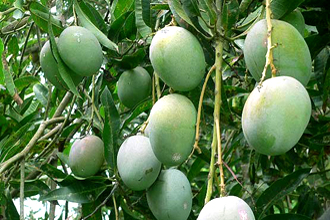
|
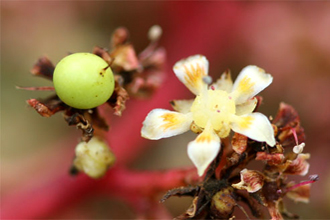
|
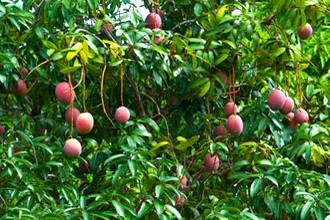 |
| |
|
|
| Mango - Fruit |
Mango - Blossom |
Mango - Tree |
| Fruit Grower - Information |
TMF Florida Fruits
Southern Florida has long been the site of tropical and subtropical fruit production and research. Specialty tropical fruits have been part of the Florida tropical fruits research program at the TREC - Tropical Research and Educational Center - (www.trec.ifas.ufl.edu) since its establishment in 1930.
The future of tropical fruits in South Florida seems very bright, especially considering the involvement and investment of local growers in the important research efforts. The 1980's saw a major increase in the areas planted to specialty tropical fruits in southern Florida.
A wealth of International scientific and medical research (www.nutrionomics.com) supports the medical and nutritional health benefits of tropical and subtropical fruits, high in bio-natural vitamins, minerals, enzymes and other vital nutrients. Exemplary marketing campaigns supported by proven scientific research have accompanied increases in fruit production and should serve as a model for other industries and societies.
For the consumers... the immediate goal of TMF Florida is to promote the campaign for healthy living and support the finally emerging "Green Wave" in Nutrition, to help the end consumer to better understand the cardinal importance of their daily nutritional decisions, and to experience the significance of optimal bio-natural nutrition upon their health and lifestyle.
For the Florida fruit grower... TMF Florida represents the show window for their wonderful fruits and the marketing strategy so deeply ignored in the past - based on all the internet possibilities available today and certainly increasing exponentially in the future.
|
_________________________________________
_________________________________________
|

Copyright @ 2012 www.TMFflorida.com. www.TropicalMedicalFruits.com. All rights reserved.
|
|